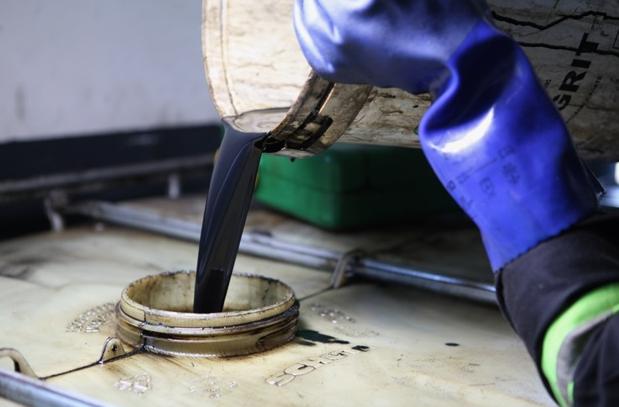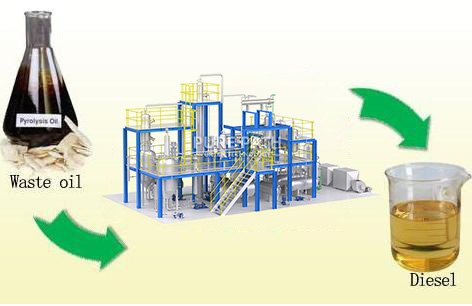Environmental Benefits of Waste Oil Treatment and Recycling
Waste oil treatment and recycling can reduce environmental pollution, save resources, and reduce dependence on traditional energy. It brings environmental and economic benefits by removing harmful substances and producing clean energy, while promoting circular economy and sustainable development.
Technologies Used to Treat Waste Oil and Reduce Soil and Water Pollution
The purpose of waste oil treatment technology is to remove harmful substances from waste oil to reduce pollution to soil and water sources. These technologies usually include physical methods, chemical methods and biological methods.
Common Waste Oil Treatment Technologies
- Physical methods: including precipitation separation, filtration and distillation, etc. These methods separate impurities and water in waste oil through physical action.
- Chemical methods: involving acid-base neutralization, redox reaction and activated carbon adsorption, etc. These methods use chemical reactions to convert harmful substances in waste oil into harmless substances.
- Biological methods: using the metabolic activity of microorganisms to convert harmful substances in waste oil into harmless substances, including biological treatment technologies such as anaerobic digestion and aerobic treatment.
These technologies help prevent soil and water pollution by effectively removing pollutants from waste oil. For example, biodegradation can convert waste oil into harmless substances and reduce environmental pollution. Physical methods such as oil-water separation can directly separate waste oil and water to prevent the two from mixing and entering the environment.

Environmental Protection Technology in The Process of Waste Oil Recycling
There are many environmental protection technologies involved in the recycling of waste oil, which are designed to effectively remove impurities in waste oil, reduce environmental pollution, and improve the quality of recycled oil. The following are some common environmental protection technologies
- High-efficiency separation technology: Use physical methods to achieve efficient removal of impurities in waste oil and improve the quality of recycled oil. This technology usually includes steps such as sedimentation, filtration, and centrifugal separation.
- Energy-saving and environmental protection design: Consider energy consumption and emissions in the design of processing equipment to reduce environmental impact and meet the requirements of green and sustainable development.
- Intelligent operation: Use automated control and monitoring systems to improve operational efficiency and safety while reducing environmental risks caused by human errors.
- Nanotechnology: Use nanomaterials to adsorb impurities in waste oil and improve the purity of waste oil. This is an emerging purification technology.
- Biotechnology: Use specific microorganisms or enzymes to catalyze the conversion of waste oil to produce biofuels or other valuable compounds. This technology uses biodegradation to reduce pollution.
- Hydrogenation refining process: This is a technology widely used abroad. It removes impurities such as sulfur and nitrogen in waste oil through hydrogenation reactions to improve the quality of oil products.
The application of these technologies helps to improve the efficiency and environmental friendliness of waste oil recycling, while promoting the recycling of resources and environmental protection. With the continuous innovation and optimization of technology, the environmental benefits of waste oil recycling will be further improved.

Environmental Benefits of Biodiesel Over Traditional Fuels
- Biodiesel is a renewable energy source made from vegetable oils or animal fats that offers significant environmental benefits over traditional fossil fuels. The production and use of biodiesel produces less emissions, helps reduce greenhouse gas emissions, and has a positive effect on improving air quality and protecting the global environment.
- Reduced greenhouse gas emissions: Biodiesel releases lower carbon dioxide emissions when burned because during the production process of biodiesel, plant raw materials absorb carbon dioxide from the atmosphere, thereby recycling carbon.
- Improve air quality: Biodiesel has low sulfur content and can significantly reduce sulfur dioxide and sulfide emissions, helping to improve air quality.
- Biodegradability: Biodiesel has good biodegradability, which means that it is easily decomposed and utilized by microorganisms in the environment and will not accumulate in soil or water for a long time, thereby reducing potential harm to the ecological environment.
- Renewability: The raw materials of biodiesel mainly come from renewable resources such as vegetable oil, animal oil, and waste grease, which means that its supply will not be limited by limited mineral resources, which is conducive to ensuring energy security and promoting sustainable economic development.
In summary, biodiesel has significant environmental advantages in reducing emissions, biodegradability, reducing greenhouse gas emissions, and renewable raw materials, and is a clean and sustainable energy alternative.
How Does Waste Oil Recycling Contribute to A Circular Economy?

Waste oil recycling is a key part of the circular economy. By reusing waste oil resources, it achieves resource conservation and environmental protection. It reduces the demand for new oil resources, reduces energy consumption and environmental pollution, and promotes sustainable development. Technological advances enable waste oil to be converted into recycled oil, replacing some traditional energy sources and reducing energy and raw material costs.
Government policy support and market demand growth have further promoted the development of the waste oil recycling industry, promoted technological innovation and industrial agglomeration, cultivated key enterprises in the industry, and improved recycling efficiency and quality. This process effectively promotes the development of the circular economy and helps green economic transformation and environmental health.
Purepath Waste Oil Recycling Technology
PurePath Waste Oil Recycling Technology specializes in converting waste oil into valuable resources using advanced and sustainable methods. Our waste oil recycling plants employ cutting-edge technologies like fractional distillation, waste oil fractionation equipment, and desulfurization processes to transform used oils, such as motor oil and industrial lubricants, into high-quality base oils and other products. This approach not only reduces the environmental impact of waste oil but also supports the circular economy by minimizing reliance on virgin oil extraction.
PurePath’s services extend from project consulting and engineering design to the complete installation and operation of recycling plants. We offer turnkey solutions tailored to various industries, ensuring that our clients can meet both environmental regulations and operational goals. With a strong commitment to sustainability, innovation, and customer satisfaction, PurePath has established a global reputation as a leader in waste oil recycling technology. For anything about waste oil recycling plant, feel free contact our service team.







